This article was co-authored by Kevin Stone, MD. Dr. Kevin Stone is an orthopaedic surgeon and the founder of The Stone Clinic, a leading orthopaedic surgery, sports medicine, and rehabilitation clinic in the San Francisco Bay Area. With over 30 years of experience, Dr. Stone specializes in knee, shoulder, and ankle repair, using biologic reconstruction and joint replacement. He holds a BS in Biology from Harvard University and a Doctor of Medicine (MD) from the University of North Carolina at Chapel Hill. Dr. Stone completed his residency in Internal Medicine and Orthopaedic Surgery at Harvard University and in General Surgery at Stanford University. He then completed a fellowship in Orthopaedic Research and Surgery at the Hospital for Special Surgery and Tahoe Orthopaedics. He lectures around the world as an expert in cartilage and meniscal growth, replacement, and repair and holds over 40 U.S. patents on novel inventions to improve healthcare. Dr. Stone is a physician for Smuin Ballet and has served as a physician for the U.S. Ski Team, the U.S. Pro Ski Tour, the United States Olympic Training Center, and World Pro Ski Tour.
There are 27 references cited in this article, which can be found at the bottom of the page.
wikiHow marks an article as reader-approved once it receives enough positive feedback. This article received 12 testimonials and 100% of readers who voted found it helpful, earning it our reader-approved status.
This article has been viewed 281,363 times.
Your bones are made up of collagen and calcium, but they’re much more than the lifeless skeletons that you see in Biology classrooms or on Halloween. Your body is constantly breaking down and renewing your bones through remodeling. Like remodeling a house, your body breaks down and discards old bone tissue and replaces it with new tissue, so it’s important that you give it what it needs in order to build strong bones. Keeping bones strong is especially important for women because 1 in 2 women will have an osteoporosis-related fracture in their lifetime.[1] For men, the lifetime risk is 1 in 4. While some people are naturally at a higher risk of weaker bones than others, there are many things you can do to build stronger bones throughout your life.
Steps
Eating a Healthy Diet
-
1Consume enough calcium each day to keep your bones strong. Eat lots of leafy greens, beans, and dairy products such as milk, cheese, and yogurt, to absorb calcium through your diet. Choose calcium-fortified soymilk, almond milk, and other dairy substitutes. Tofu can also be enriched with calcium. Some juices and other beverages have added calcium, too. The recommended daily intake of calcium varies depending on your age and sex, and you shouldn't consume more than this unless instructed by your doctor.[2]
- It's important to get enough calcium to grow and maintain healthy, strong bones. Many people, especially women, don't get enough calcium in their daily diets.
- Vegetable sources rich in calcium include turnip and collard greens, Chinese cabbage (bok choy), black-eyed peas, kale, and broccoli. Spinach is healthy, but it's not as effective as a source of calcium as other greens because its oxalic acid content reduces the availability of its calcium to your body.[3]
- Canned sardines and canned salmon are excellent sources of calcium because the bones are meant to be eaten. Sardines and salmon are also excellent sources of omega-3 fatty acids, which improve brain health and may contribute to better mood. They also contain vitamin D, which helps your body absorb calcium.
- Most adults need to consume between 2,000-2,500mg of calcium each day.
- Children under age 1 should get between 200-260mg a day. Children under age 3 should get about 700mg of calcium per day. Children from 4-8 should get 1,000mg. Older children and teens need about 1,300mg per day. During childhood and the teen years, your body adds new bone faster than it is removed, so you need extra calcium during these years.[4]
- Adults under 50 should get about 1,000mg daily, and women over 50 should boost their intake to about 1,200mg daily. All adults over 70 should consume 1,200mg daily.
- Calcium is available in dietary supplements, but you should only take these as instructed by your doctor. Too much calcium can cause constipation and kidney stones, among other unpleasant side effects.[5]
-
2Get enough vitamin D to help your body absorb calcium. Vitamin D helps improve your body's ability to absorb calcium. Vitamin D also plays a crucial role in bone remodeling. Without enough vitamin D, your bones can become brittle and weak. The amount of vitamin D you need varies depending on your age. Spend between 5-30 minutes in the sunshine at least twice a week to naturally synthesize vitamin D.[6]
- Infants under 1 year should get at least 400IU of vitamin D. Human breastmilk cannot usually supply enough vitamin D; nutritional rickets can occur in infants who do not get supplemental vitamin D. The American Academy of Pediatrics recommends that you supplement your infant's breastfeeding with 400IU of vitamin D in an oral solution per day.
- Children 1 and up and adults should get about 600IU of vitamin D daily. People over 70 should increase this to 800IU daily.[7]
- Most foods contain little or no Vitamin D. Fatty fish, such as swordfish, salmon, tuna, and mackerel are the best sources of natural vitamin D, as well as omega-3 fatty acids. Foods like beef liver, cheese, and egg yolks also contain small amounts of vitamin D. Milk and breakfast cereals are commonly fortified with vitamins A and D.[8]
- Your body synthesizes vitamin D when it's exposed to the ultraviolet rays in sunshine. People with higher levels of melanin have darker skin and produce less vitamin D from sun exposure. Spend less time in the sun if you burn easily, more if you tan more easily.
- Vitamin D is also available as a dietary supplement. This may be necessary for vegans and vegetarians who don't consume animal products, as well as those who don't live in an area with much sunshine or have darker skin. It is available in two forms, D2 and D3. Both seem equally potent in regular doses, although D2 may be less potent in high doses. Vitamin D toxicity is rare.
Warning: Regular sun exposure does still elevate your risk of skin cancer, so be wise about your sun exposure and wear sunscreen.
Advertisement -
3Avoid eating too much or too little protein. Very low protein consumption may interfere with your body's ability to form new bone.[9] However, too much protein is equally bad for your bones and can affect your body's ability to absorb calcium. Your body's protein needs vary depending on your sex and age, but it’s important that you consume an adequate amount to keep your bones strong.[10]
- Children under 3 should get at least 13 grams of protein per day. Children aged 4-8 should get 19 grams a day. Children between 9 and 13 should get 34 grams a day
- Teenagers need more protein than children, and boys usually need more than girls. Young women aged 14-18 should get at least 46 grams a day, and young men aged 14-18 should get at least 52 grams a day.
- Adult women should get at least 46 grams of protein a day, although elderly women may need to eat 50 or more to help prevent bone loss.[11] Adult men should get at least 56 grams of protein per day.
- Healthy diets incorporate protein from a variety of sources, including lean meats, eggs, and vegetables and whole grains.
- Animal protein that is high in saturated fat, such as red meat and dairy products, can cause health issues if you eat them too often.[12]
-
4Include magnesium-rich foods in your diet to avoid calcium deficiency. Magnesium competes with calcium for absorption in your body, so if your calcium levels are already low, magnesium may cause a calcium deficiency. Getting enough calcium and magnesium will help keep you and your bones strong and healthy. Be sure to add foods to your diet that are rich sources of dietary magnesium, including nuts, green leafy vegetables, whole grains, and legumes.[13]
- The amount of magnesium you need varies based on your age and sex. Infants younger than 1 year should get between 30-75mg per day. Children from 1-3 should get 80mg daily. Children aged 4-8 need 130mg per day. Children from 9-13 need 240mg a day.
- Teenage boys need 410mg per day. Teenage girls need 360mg. Pregnant teenagers should get at least 400mg daily.
- Adult males should get between 400-420mg per day, and adult females should get at least 310-320mg per day.
- Most food that provides dietary fiber will also provide magnesium.
- Avocados, potatoes with their skins, and bananas are also good sources of magnesium.
-
5Add foods rich in B vitamins to your diet so your bones can repair. A vitamin B12 deficiency can reduce the number of osteoblasts in your body, which help form new bone when the old tissue has been destroyed. Getting enough B12 will help ensure that your bones are replenished and strong. Eat good dietary sources of Vitamin B12 such as shellfish, organ meats, red meat, and fish. Fortified dairy products and cereals can also contain B12.[14]
- The amount of B12 you need depends on your age. Infants under 1 year should get between 0.4-0.5mcg per day. Children between ages 1-3 should get 0.9mcg, and between ages 4-8 should get 1.2mcg. Children who are between 9 and 13 years old should get 1.8mcg per day.
- Children 14 and older and adults should get at least 2.4mcg of Vitamin B12 daily. Pregnant and lactating women should get slightly more vitamin B12, between 2.6-2.8mcg.
Tip: Because B12 rarely exists naturally in plant-based food, vegetarians and vegans may find it more difficult to get adequate B12. B12 is also available as a dietary supplement as a capsule or sublingual liquid.
-
6Make sure you get plenty of vitamin C to promote collagen synthesis. Collagen provides a framework that the calcium builds on. Vitamin C has been shown to stimulate procollagen and enhance collagen synthesis in your body, so it’s important that you get enough of it to keep your bones strong. Excellent dietary sources of vitamin C include Citrus fruits and juices, red and green peppers, tomatoes, kiwifruit, strawberries, cantaloupe, and Brussels sprouts.[15]
- The amount of vitamin C you need depends on your age and sex, but most people get plenty. Infants under 1 year can get sufficient vitamin C from formula or breastmilk. Children 1-3 should get at least 15mg per day. Children 4-8 should get 25mg daily. Children between ages 9-13 need 45mg a day.
- Older teens (14-18) need 65-75mg per day. Adult men should get at least 90mg of vitamin C per day, and adult women should get at least 75mg per day.
- Pregnant women should get between 80-85mg a day, and breastfeeding women should get between 115-120mg a day.
- Cabbage, cauliflower, potatoes, spinach, and peas, as well as fortified cereals and other products, are also good sources of vitamin C.
- People who smoke should consume at least 35mg more than the daily recommendation. Smoke decreases your body's vitamin C levels.
-
7Reduce your risk of bone fractures by consuming enough vitamin K. Vitamin K increases bone density and strength, reducing your risk of bone fractures and breaks. Vitamin K is found in many foods including green leafy vegetables such as spinach and broccoli, and vegetable oils, nuts, fruits (especially berries, grapes, and figs), and fermented foods such as Natto and cheese.[16]
- Infants under 6 months should get 2mcg per day. Infants 7-12 months should get 2.5mcg. Children between 1 and 3 need at least 30mcg daily. Children between 4-8 should get 55mcg. Children between 9-13 should get 60mcg.
- Teenagers need 75mcg daily. Adult males (18+) should get at least 120mcg per day, and adult females should get at least 90mcg per day.
-
8Avoid taking vitamin E supplements unless directed by a doctor. Vitamin E is an antioxidant with anti-inflammatory properties that fights free radicals in your body that can cause cell damage. However, vitamin E supplements may provide 100IU or more per dose, which is much more than the daily recommended intake. Use of vitamin E 'supplements' may decrease bone mass and prevent your body from making new bone tissues effectively, so don't take them without consulting your doctor first.[17]
- Infants under 6 months should get 4mg/6IU daily. Infants 7-12 months should get 5mg/7.5IU. Children between 1 and 3 should get 6mg/9IU daily. Children 4-8 should get 7mg/10.4IU per day. Children 9-13 need 11mg/16.4IU per day.
- Children 14+ and adults should get at least 15mg/22.4IU per day. Lactating mothers need slightly more, around 19mg/28.4IU daily.
- Good dietary sources of vitamin E should include at least 10% of your daily value and include wheat germ oil, sunflower seeds, almonds, and plant oils. While not as concentrated, other dietary sources of vitamin E include peanuts, broccoli, kiwifruit, mango, tomato, and spinach.[18]
-
9Keep your caffeine consumption below 400mg a day. Consuming too much caffeine from beverages such as cola and coffee is linked by some studies to bone loss, although the exact relationship is still unclear. Limit your caffeine to 400mg a day or less to avoid weakening your bones.[19]
- Children and youth under 18 should not have caffeine, which has been linked to several health and development issues. Caffeine will not stunt growth in children, but it can cause many other issues including heart palpitations and anxiety.[20]
- The phosphoric acid in cola may also leach calcium out of bones. Soft drinks like ginger ale and lemon-lime soda that don't contain phosphoric acid are not linked to bone loss, although the sugar in many of these drinks isn't good for you.[21]
Making Healthy Lifestyle Choices
-
1Avoid restricting your calories unless it’s recommended by a doctor. Dieting that involves severe calorie restriction is linked to weaker bones and bone loss. Your body needs a certain level of calories and nutrition every day to maintain strong bones and muscles, but many fad diets don't provide a healthy balance. If you need to lose weight, consult your doctor or a professional nutritionist or dietician for a healthy eating and exercise regimen.[22]
- People with anorexia nervosa, an eating disorder in which people severely restrict calories for a long period of time, are at a higher risk of developing osteoporosis.
- People who are extremely thin, whether naturally or through dieting, are also at an elevated risk of osteoporosis.[23]
-
2Consume alcohol in moderation to keep your bones strong. Long-term, heavy alcohol consumption can interfere with bone remodeling. It weakens your bones and increases your risk of fractures and breaks. This is especially true for adolescents who consume alcohol. If you do drink alcohol, do it only in moderation.[24]
- The National Institute on Alcohol Abuse and Alcoholism states that “low-risk” or “moderate” drinking is the safest way to avoid negative health effects from alcohol. This is defined as no more than 3 drinks on a given day, and no more than 7 per week for women. For men, it's no more than 4 drinks on a given day, and no more than 14 per week.[25]
-
3Get at least 30 minutes of weight-bearing exercise every day. People who get regular exercise tend to have stronger, denser bones. Weight-bearing exercise, where your bones have to carry your body weight around, is especially important to building strong bones. The American Academy of Orthopedic Surgeons recommends activities like brisk walking, dancing, aerobics, and weight training to help build and maintain bone mass.[26]
- Exercise is particularly important for women, who reach peak bone mass earlier than men do.
- Getting regular exercise starting in childhood is the best way to continue healthy habits throughout your life. Encourage children to run around, jump, dance, and play sports.
- Jumping as high as you can 10 times twice a day can help strengthen bones, too.[27]
- Heavy yard work or gardening, skiing, skating, and karate are also good choices.
- Exercises such as swimming and biking don't require you to move your body weight around, so while they're great as part of an overall fitness plan, they're not as good for building bone.
- If you have risk factors for osteoporosis or other health conditions, consult with your doctor or a physical therapist to make sure you get an exercise plan that is safe and healthy for you.
-
4Stop smoking and avoid secondhand smoke. Smoking is incredibly harmful for every part of your body, and your bones are no exception. Smoking interferes with your body's use of vitamin D to absorb calcium and interferes with your body's ability to use vitamin C to create new collagen. Both of these things weaken your bones. In fact, smoking is directly linked to lower bone density. If you do smoke, try quitting as soon as you can.[28]
- Smoking also lowers estrogen levels in men and women. Estrogen is crucial to helping your bones retain calcium and other minerals.[29]
- Studies have shown that exposure to secondhand smoke exposure during youth and early adulthood may increase the risk of developing low bone mass later. Keep children and growing youth away from areas with secondhand smoke.[30]
Expert Q&A
Did you know you can get expert answers for this article?
Unlock expert answers by supporting wikiHow
-
QuestionWhat's the best way to improve my bone health?
 Kevin Stone, MDDr. Kevin Stone is an orthopaedic surgeon and the founder of The Stone Clinic, a leading orthopaedic surgery, sports medicine, and rehabilitation clinic in the San Francisco Bay Area. With over 30 years of experience, Dr. Stone specializes in knee, shoulder, and ankle repair, using biologic reconstruction and joint replacement. He holds a BS in Biology from Harvard University and a Doctor of Medicine (MD) from the University of North Carolina at Chapel Hill. Dr. Stone completed his residency in Internal Medicine and Orthopaedic Surgery at Harvard University and in General Surgery at Stanford University. He then completed a fellowship in Orthopaedic Research and Surgery at the Hospital for Special Surgery and Tahoe Orthopaedics. He lectures around the world as an expert in cartilage and meniscal growth, replacement, and repair and holds over 40 U.S. patents on novel inventions to improve healthcare. Dr. Stone is a physician for Smuin Ballet and has served as a physician for the U.S. Ski Team, the U.S. Pro Ski Tour, the United States Olympic Training Center, and World Pro Ski Tour.
Kevin Stone, MDDr. Kevin Stone is an orthopaedic surgeon and the founder of The Stone Clinic, a leading orthopaedic surgery, sports medicine, and rehabilitation clinic in the San Francisco Bay Area. With over 30 years of experience, Dr. Stone specializes in knee, shoulder, and ankle repair, using biologic reconstruction and joint replacement. He holds a BS in Biology from Harvard University and a Doctor of Medicine (MD) from the University of North Carolina at Chapel Hill. Dr. Stone completed his residency in Internal Medicine and Orthopaedic Surgery at Harvard University and in General Surgery at Stanford University. He then completed a fellowship in Orthopaedic Research and Surgery at the Hospital for Special Surgery and Tahoe Orthopaedics. He lectures around the world as an expert in cartilage and meniscal growth, replacement, and repair and holds over 40 U.S. patents on novel inventions to improve healthcare. Dr. Stone is a physician for Smuin Ballet and has served as a physician for the U.S. Ski Team, the U.S. Pro Ski Tour, the United States Olympic Training Center, and World Pro Ski Tour.
Board Certified Orthopaedic Surgeon
-
QuestionHow does working out help my bones?
 Kevin Stone, MDDr. Kevin Stone is an orthopaedic surgeon and the founder of The Stone Clinic, a leading orthopaedic surgery, sports medicine, and rehabilitation clinic in the San Francisco Bay Area. With over 30 years of experience, Dr. Stone specializes in knee, shoulder, and ankle repair, using biologic reconstruction and joint replacement. He holds a BS in Biology from Harvard University and a Doctor of Medicine (MD) from the University of North Carolina at Chapel Hill. Dr. Stone completed his residency in Internal Medicine and Orthopaedic Surgery at Harvard University and in General Surgery at Stanford University. He then completed a fellowship in Orthopaedic Research and Surgery at the Hospital for Special Surgery and Tahoe Orthopaedics. He lectures around the world as an expert in cartilage and meniscal growth, replacement, and repair and holds over 40 U.S. patents on novel inventions to improve healthcare. Dr. Stone is a physician for Smuin Ballet and has served as a physician for the U.S. Ski Team, the U.S. Pro Ski Tour, the United States Olympic Training Center, and World Pro Ski Tour.
Kevin Stone, MDDr. Kevin Stone is an orthopaedic surgeon and the founder of The Stone Clinic, a leading orthopaedic surgery, sports medicine, and rehabilitation clinic in the San Francisco Bay Area. With over 30 years of experience, Dr. Stone specializes in knee, shoulder, and ankle repair, using biologic reconstruction and joint replacement. He holds a BS in Biology from Harvard University and a Doctor of Medicine (MD) from the University of North Carolina at Chapel Hill. Dr. Stone completed his residency in Internal Medicine and Orthopaedic Surgery at Harvard University and in General Surgery at Stanford University. He then completed a fellowship in Orthopaedic Research and Surgery at the Hospital for Special Surgery and Tahoe Orthopaedics. He lectures around the world as an expert in cartilage and meniscal growth, replacement, and repair and holds over 40 U.S. patents on novel inventions to improve healthcare. Dr. Stone is a physician for Smuin Ballet and has served as a physician for the U.S. Ski Team, the U.S. Pro Ski Tour, the United States Olympic Training Center, and World Pro Ski Tour.
Board Certified Orthopaedic Surgeon
-
QuestionWill something like yoga improve my bone strength?
 Kevin Stone, MDDr. Kevin Stone is an orthopaedic surgeon and the founder of The Stone Clinic, a leading orthopaedic surgery, sports medicine, and rehabilitation clinic in the San Francisco Bay Area. With over 30 years of experience, Dr. Stone specializes in knee, shoulder, and ankle repair, using biologic reconstruction and joint replacement. He holds a BS in Biology from Harvard University and a Doctor of Medicine (MD) from the University of North Carolina at Chapel Hill. Dr. Stone completed his residency in Internal Medicine and Orthopaedic Surgery at Harvard University and in General Surgery at Stanford University. He then completed a fellowship in Orthopaedic Research and Surgery at the Hospital for Special Surgery and Tahoe Orthopaedics. He lectures around the world as an expert in cartilage and meniscal growth, replacement, and repair and holds over 40 U.S. patents on novel inventions to improve healthcare. Dr. Stone is a physician for Smuin Ballet and has served as a physician for the U.S. Ski Team, the U.S. Pro Ski Tour, the United States Olympic Training Center, and World Pro Ski Tour.
Kevin Stone, MDDr. Kevin Stone is an orthopaedic surgeon and the founder of The Stone Clinic, a leading orthopaedic surgery, sports medicine, and rehabilitation clinic in the San Francisco Bay Area. With over 30 years of experience, Dr. Stone specializes in knee, shoulder, and ankle repair, using biologic reconstruction and joint replacement. He holds a BS in Biology from Harvard University and a Doctor of Medicine (MD) from the University of North Carolina at Chapel Hill. Dr. Stone completed his residency in Internal Medicine and Orthopaedic Surgery at Harvard University and in General Surgery at Stanford University. He then completed a fellowship in Orthopaedic Research and Surgery at the Hospital for Special Surgery and Tahoe Orthopaedics. He lectures around the world as an expert in cartilage and meniscal growth, replacement, and repair and holds over 40 U.S. patents on novel inventions to improve healthcare. Dr. Stone is a physician for Smuin Ballet and has served as a physician for the U.S. Ski Team, the U.S. Pro Ski Tour, the United States Olympic Training Center, and World Pro Ski Tour.
Board Certified Orthopaedic Surgeon Yes! Improving your flexibility is one of the best things you can do for your skeletal system. If you're stiff or you have a limited range of motion, your joints aren't going to be using their full range of motion. That can lead to overloading at certain points in your skeletal system, so something like yoga would definitely have some benefits.
Yes! Improving your flexibility is one of the best things you can do for your skeletal system. If you're stiff or you have a limited range of motion, your joints aren't going to be using their full range of motion. That can lead to overloading at certain points in your skeletal system, so something like yoga would definitely have some benefits.
Warnings
- Don't over consume calcium. Taken in excess, it can create kidney problems, aggravate arthritis, and cause muscle pain.⧼thumbs_response⧽
- Wear sunscreen whenever you go out in the sun to reduce your chance of getting skin cancer.⧼thumbs_response⧽
References
- ↑ http://www.niams.nih.gov/Health_Info/Bone/Bone_Health/
- ↑ http://www.hsph.harvard.edu/nutritionsource/calcium-sources/
- ↑ http://nof.org/foods
- ↑ http://www.niams.nih.gov/Health_Info/Bone/Bone_Health/
- ↑ http://www.ncbi.nlm.nih.gov/pubmedhealth/PMH0072714/
- ↑ http://ods.od.nih.gov/factsheets/VitaminD-HealthProfessional/
- ↑ http://www.nlm.nih.gov/medlineplus/magazine/issues/winter11/articles/winter11pg12.html
- ↑ http://ods.od.nih.gov/factsheets/VitaminD-HealthProfessional/
- ↑ http://www.ncbi.nlm.nih.gov/pubmed/15018487
- ↑ http://aje.oxfordjournals.org/content/143/5/472.abstract?ijkey=616fc59218d11df565ddf833ecf9db852e0215af&keytype2=tf_ipsecsha
- ↑ http://www.ncbi.nlm.nih.gov/pubmed/15018487
- ↑ http://www.hsph.harvard.edu/nutritionsource/top-food-sources-of-saturated-fat-in-the-us/
- ↑ http://ods.od.nih.gov/factsheets/Magnesium-HealthProfessional/
- ↑ https://pubmed.ncbi.nlm.nih.gov/25830943/?from_term=vitamin+b+and+bone+health&from_pos=1
- ↑ http://www.ncbi.nlm.nih.gov/pubmed/11149477
- ↑ http://www.ncbi.nlm.nih.gov/pubmed/11684396
- ↑ http://www.ncbi.nlm.nih.gov/pubmed/22308007
- ↑ http://ods.od.nih.gov/factsheets/VitaminE-HealthProfessional/
- ↑ https://pubmed.ncbi.nlm.nih.gov/28438661/?from_term=caffeine+and+bone+health&from_pos=2
- ↑ https://www.tchc.org/blog/2019/03/27/is-caffeine-safe-for-your-child/#:~:text=Though%20adults%20can%20safely%20consume,not%20consume%20caffeine%20at%20all.
- ↑ https://www.health.harvard.edu/staying-healthy/does-carbonated-water-harm-bones
- ↑ https://pubmed.ncbi.nlm.nih.gov/30903600/?from_term=caloric+restriction+bone+health&from_pos=1
- ↑ http://www.niams.nih.gov/health_info/bone/Osteoporosis/conditions_Behaviors/bone_smoking.asp
- ↑ http://pubs.niaaa.nih.gov/publications/arh22-3/190.pdf
- ↑ http://www.niaaa.nih.gov/alcohol-health/overview-alcohol-consumption/moderate-binge-drinking
- ↑ http://www.ncbi.nlm.nih.gov/pubmedhealth/PMH0072714/
- ↑ http://www.prevention.com/health/health-concerns/jumping-increases-bone-density-more-running
- ↑ http://www.ncbi.nlm.nih.gov/pubmedhealth/PMH0072714/
- ↑ http://www.upmc.com/patients-visitors/education/smoking/Pages/smoking-and-your-bones.aspx
- ↑ http://www.niams.nih.gov/health_info/bone/Osteoporosis/conditions_Behaviors/bone_smoking.asp
About This Article
To build stronger bones, you should eat calcium-rich foods like low-fat yogurt, broccoli, and bread. You should also make sure you’re getting enough Vitamin D to help your body absorb calcium, so try eating fish like salmon and tuna, or taking a Vitamin D supplement. Besides getting the right nutrients, you should exercise for at least 30 minutes each day to build up your bone mass. You can do weight-bearing exercises like walking and running to build up your bone density. If you have osteoporosis, you can try swimming or biking, which are easier on the joints. To learn how to introduce more magnesium into your diet to build strong bones, read more from our Medical co-author!
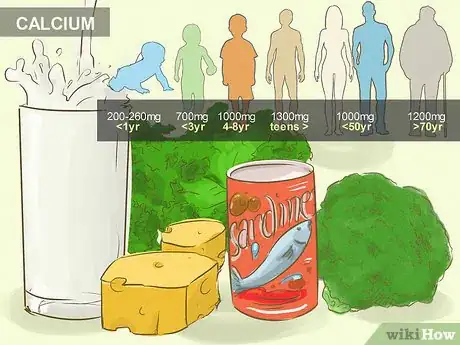
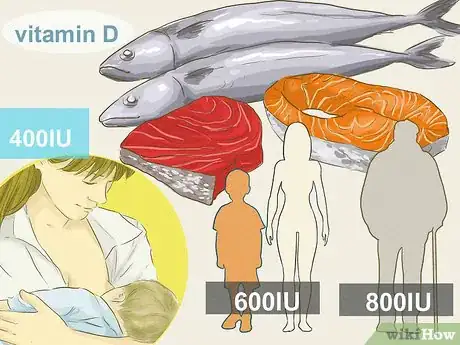
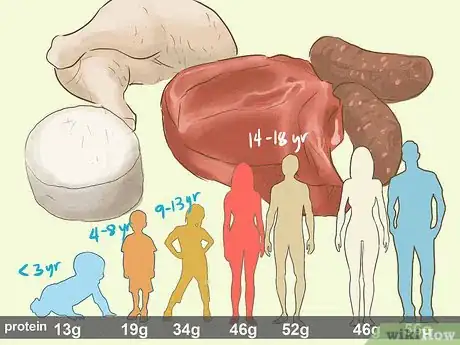
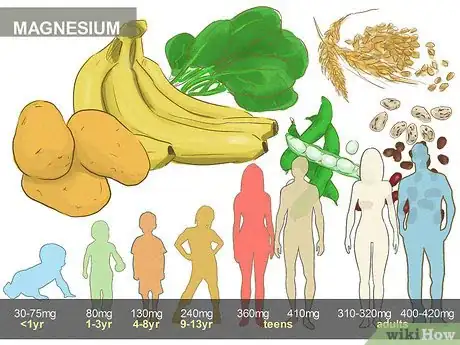
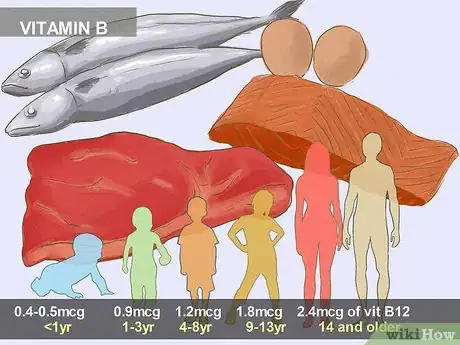
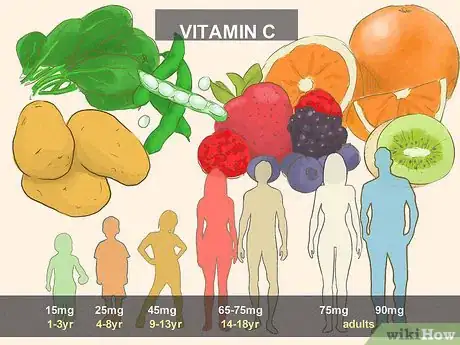
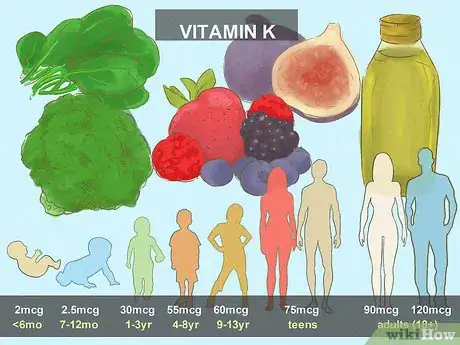
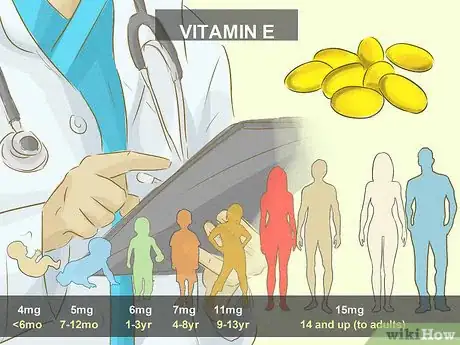
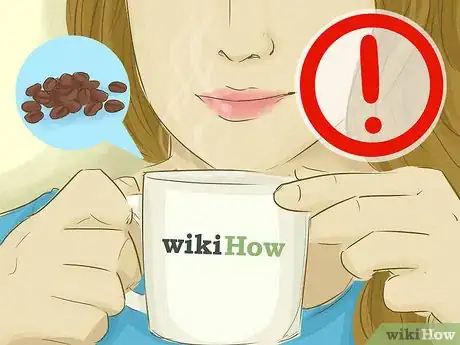
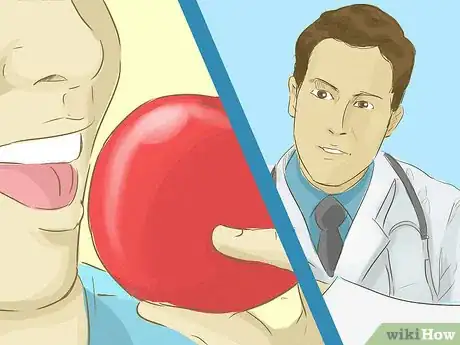
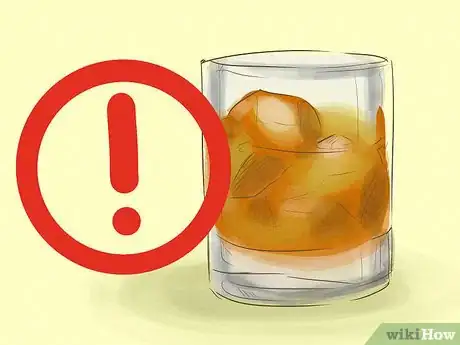
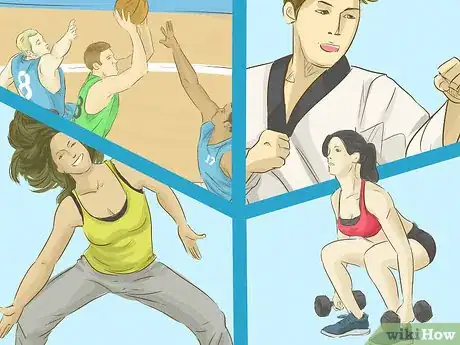
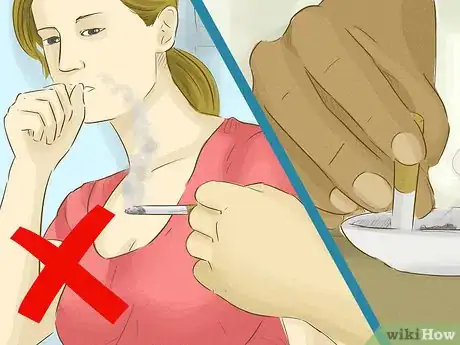


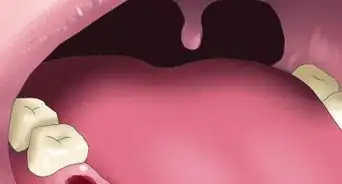
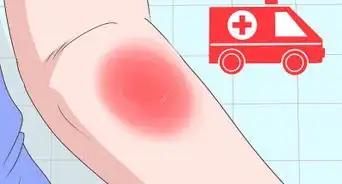
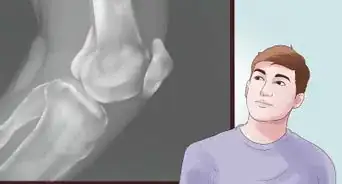
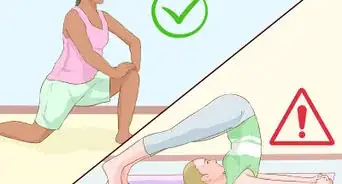
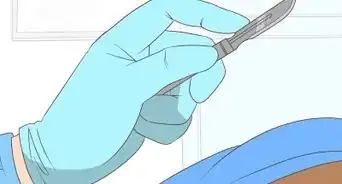
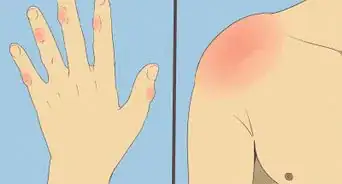

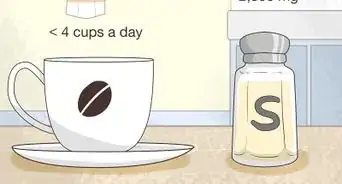
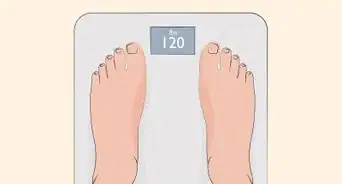














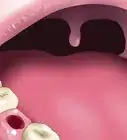
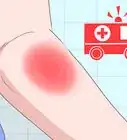



































Medical Disclaimer
The content of this article is not intended to be a substitute for professional medical advice, examination, diagnosis, or treatment. You should always contact your doctor or other qualified healthcare professional before starting, changing, or stopping any kind of health treatment.
Read More...